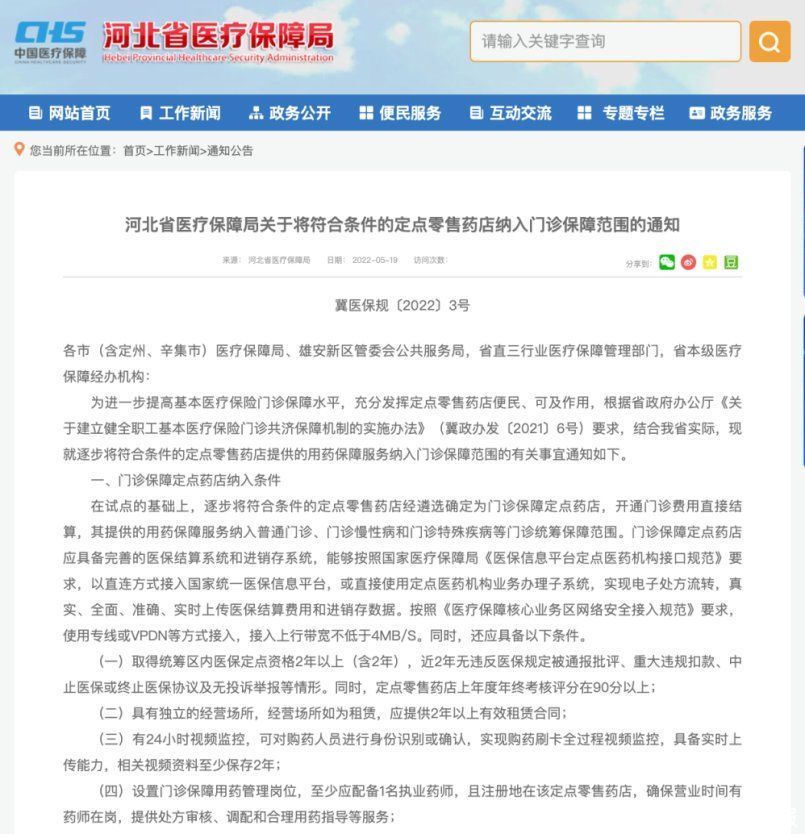(People’s Daily Health Client Reporter Xu Shiyu) According to the “Notice on Including Eligible Designated Retail Pharmacies in the Outpatient Insurance Scope” issued by the Hebei Provincial Medical Insurance Bureau, the pilot pharmacies will realize direct credit card settlement by the end of June. Insured persons who enjoy outpatient insurance benefits can purchase medicines at designated outpatient insurance pharmacies with their social security cards or medical insurance electronic vouchers directly by swiping their cards for settlement. They can purchase medicines with a prescription or without a prescription. The reporter’s inquiry found that Hebei Province is the first province in China to include designated pharmacies in outpatient care.
“If the medical insurance departments of all provinces in the country promote the inclusion of designated pharmacies in outpatient insurance as in Hebei, it will accelerate the change of the traditional mode and habits of the common people’s use of medical drugs, become more rational, and improve the convenience of common people’s drug use. , accessibility.” On May 23, Professor Shi Luwen, director of the International Research Center for Pharmaceutical Management at Peking University, said in an interview with the People’s Daily Health Client.

The markup rate for designated pharmacies shall not exceed 15%, and at least one licensed pharmacist is required p>
The notice from the Hebei Provincial Medical Insurance Bureau mentioned that for other drugs in the medical insurance catalogue, the markup rate shall not exceed 15% of the actual purchase price as the medical insurance payment standard. The maximum increase is not more than 75 yuan as the medical insurance payment standard. To set up an outpatient security drug management post, at least one licensed pharmacist should be provided, and the registered place should be in the designated retail pharmacy to ensure that there are pharmacists on duty during business hours, and to provide services such as prescription review, dispensing and rational drug use guidance.
Shi Luwen said that in the 13th Five-Year National Food and Drug Safety Plan, it was mentioned that a pharmacy must be equipped with licensed pharmacists, but in the actual implementation process, many pharmacists only “registered” in pharmacies. The clear regulations on licensed pharmacists in pharmacies are conducive to the standardized development of the licensed pharmacist industry.
Change the traditional mode of people’s use of medical drugs and adjust the existing structural problems of drug use
On April 22, 2021, the General Office of the State Council issued the “On Guiding Opinions on Establishing and Improving Outpatient Mutual Aid Security Mechanisms for Employee Basic Medical Insurance, which mentions that drug security services provided by eligible designated retail pharmacies will be included in the scope of outpatient insurance, and the settlement and dispensing of external prescriptions in designated retail pharmacies will be fully utilized. The convenience and accessibility of designated retail pharmacies.
In Shi Luwen’s view, the long-term implementation of the inclusion of designated retail pharmacies in outpatient insurance will change the current traditional model of a large number of patients entering the hospital to see a doctor, seek medical treatment, and get medicine. The notice mentioned that there are two ways to purchase medicines with prescriptions and without prescriptions. Patients with mild illnesses and chronic diseases can get medicines with prescriptions at designated pharmacies, or obtain non-prescription medicines through professional recommendations of licensed pharmacists.
“This will make the hospital a professional place to truly solve intractable diseases, and the structural problems that the majority of doctors can make a living by selling medicines and maintain the development of the hospital will be adjusted.” Shi Luwen introduced, in Under the guidance and incentives of such policies, designated pharmacies will realize a three-stream closed loop of financial flow, logistics and information flow.
Of course, the implementation of the policy not only depends on the medical insurance department, but also requires the joint supervision and tracking of the three medical departments. Shi Luwen said that the most urgent task is to strengthen the quality of licensed pharmacists, to undertake the functions of rational drug use and safety guarantee of drug use, and to achieve patient service-centered drug use.